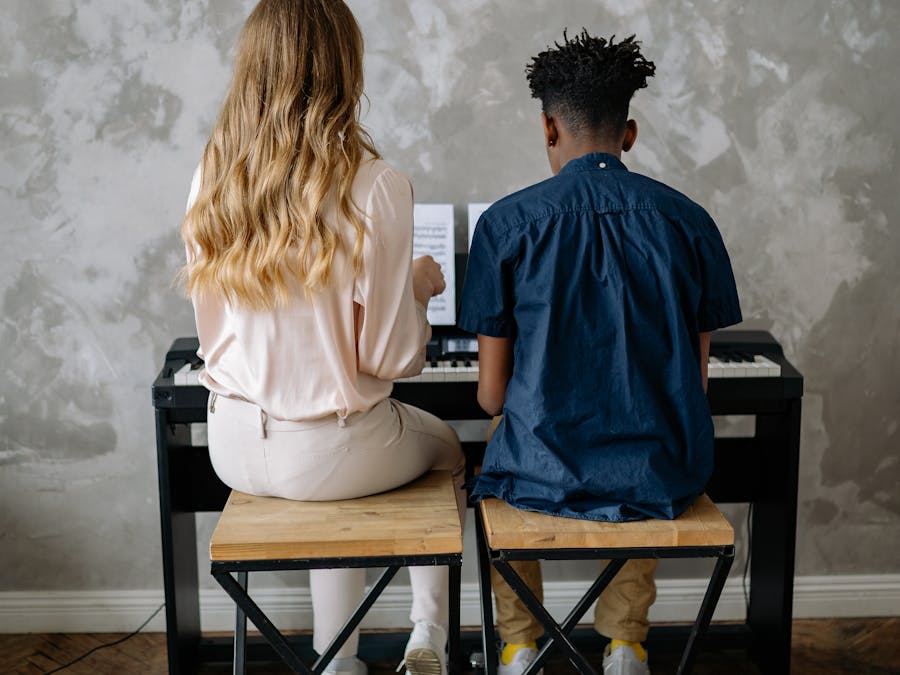 Piano Guidance
Piano Guidance
 Piano Guidance
Piano Guidance

 Photo: ROMAN ODINTSOV
Photo: ROMAN ODINTSOV
There are a range of other factors that might influence digital piano key noise - the weights in the keys may come loose and move about when playing, causing a clicking sound. You might spill something on the piano, or have dust get in underneath, which causes excess noise.

I'm very happy to tell you that the answer is that you are never too old to learn to sing! Think about it: you'd never tell someone that they were...
Read More »
Genuine ivory usually fluoresces white but this can vary depending on whether the ivory has a patina. Most natural old patinas fluoresce dull...
Read More »Digital pianos offer excellent benefits over acoustic pianos in some situations. They're more affordable, more accessible and most importantly, they're quieter, meaning that now you can practice whenever you want. Or so it would seem. Your digital piano's key noise might shock you when you finally get it home and start practicing it. What you thought would be a silent experience is now accompanied by this dull thumping sound. That's what you're feeling when you play a digital piano - the key striking the bottom of the keybed. In fact, some of the Yamaha Avantgrand models even have a dummy piano action actually installed into the case to simulate this better. It's an amazing feat when you think about it, but the bottom line is that for you to get the feel of a real piano, the key needs to hit something, and when the key hits something (usually the bottom of the keybed) it will make a noise. There are a range of other factors that might influence digital piano key noise - the weights in the keys may come loose and move about when playing, causing a clicking sound. You might spill something on the piano, or have dust get in underneath, which causes excess noise. However, these are faults, and if you're experiencing them, you should have the piano looked at by a technician or send it back to the manufacturer if it's under warranty. How to Deal With Digital Piano Key Noise While you might be frustrated that your piano is noisy, there are things that you can do to help dampen the sound. Be aware, though, that there is a certain level of noise that you're just going to have to deal with. If you try these steps and you're not happy with the level of sound caused by the keys, you might consider returning your new piano and picking a model that has a quieter action. Put your piano on a mat, or on carpet. While you might prefer a wooden floor, the fact is that if you place anything that makes noise in a room with a wooden floor, the sound is going to be much more live and have more reverberation than if you had it in a room with soft furnishings. The same applies to your digital piano. A room with a carpet or a mat will dampen the sound much more than if you put your instrument in a room with a hard floor.

The piano is one of the most difficult and rewarding instruments to learn; not only do you have to learn to read notes and translate them to the...
Read More »
Audiation is a vital skill for playing music by ear. Edwin Gordon, originator of the term, describes audiation as: "the foundation of musicianship.
Read More »Don't put your piano right up against a partition wall. If you're worried about disturbing neighbors or other residents with your piano late at night or early in the morning, you might consider moving your piano away from the wall a little. If you live in an apartment complex or a newer home where the walls are very thin, the sound of the keys thumping away can transfer through the wall and disturb other people. By moving your piano slightly away from the wall, not only is it good for the piano because there's ventilation and you're less likely to get mould behind it if you live in a high humidity area, you're also minimizing the risk that sound gets transferred to your neighbors through the walls. This advice also applies to upright pianos. Ensure you keep your piano well-maintained. As mentioned earlier, it's very likely that if dust or other foreign objects get in between or beneath the keys, they can cause excess noise. If you don't look after your piano, you may find this happens. If your piano develops faults, such as the weights in the keys become loose, you might also experience excess noise. Keep the keys covered when not in use, and if you're experiencing clicking or thumping that's not normal, consult a piano technician.

@Ricky the blue notes can be used to make tritones, but they alone are not tritones and have other applications such as chromaticism and tension. A...
Read More »
Plastic. Plastic keys are opposite of ivory keys, meaning you can use gentle cleaning solutions to whiten the keys. One of the easiest methods is...
Read More »One of the other things you can do is use the built-in metronome rather than a separate one, especially if you're using headphones. It's one thing if your piano is quiet but you're having to practice with a metronome and the metronome is loud. Interested in how to use a metronome effectively? Check out my guide on how best to employ a metronome in your practice. There are plenty of ways you can deal with it - I've just mentioned a few of them here. When you're buying your next digital piano, definitely take this into consideration - you'll be glad you did. Of course, if you want to really keep the noise down you'll need a pair of headphones. You can read my recommendations on which headphones to buy here.

The good news for those who plan on self teaching piano is that it is simpler than ever to do so, with more learning material being produced all...
Read More »
Frozen 3 has yet to be confirmed by Disney, despite the record-breaking success of the sequel that saw it become the highest-grossing animated...
Read More »
In simple terms, playing piano does actually burn more calories than most people realise. For example, it certainly burns more calories than...
Read More »
One of Yamaha's Elton John Limited Edition Signature Red pianos has just sold for $150,000. This was at the Julien's Auctions Music Icons sale...
Read More »